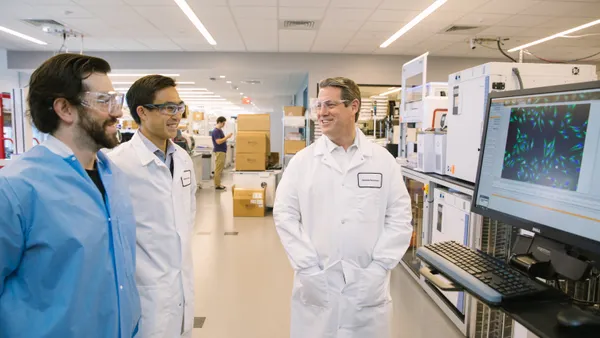The Food and Drug Administration has rejected a closely watched drug for spinal muscular atrophy, setting back a medicine its developer, Scholar Rock, believes could be part of a new standard of care for the disease.
In a Tuesday statement, Scholar Rock said the agency turned back an application for the drug, known as apitegromab, due to issues observed during an inspection of a Catalent manufacturing facility in Indiana. That facility, which Novo Nordisk acquired last year, conducts “fill-finish” services for apitegromab. The FDA didn’t cite any problems with the drug’s safety or efficacy, the company said.
According to Scholar Rock, Catalent’s Indiana facility responded to the FDA in early August and has “continued to work rapidly to take corrective action.” Once the problems are ironed out, Scholar Rock will resubmit its application and expects the agency to “act expeditiously” to make a decision, it said.
“We are continuing to work closely with Catalent Indiana on the FDA’s manufacturing observations so that we can resubmit the apitegromab BLA as soon as possible,” said Scholar Rock chairman and CEO David Hallal in the statement. “We remain focused on working hand-in-hand with the FDA to pursue approval of the first and only muscle-targeted treatment for people living with SMA.”
The rejection sets back a drug that could again change treatment for SMA, which causes progressive muscle weakness and can be lethal in infants. Prior to 2016, there were no available medicines for the disease. But since then, the FDA has approved a gene-targeting drug from Biogen, a one-time gene therapy from Novartis and an oral medication from Roche.
All three can change the disease’s course, keeping babies alive when they may have not survived otherwise, grow healthily and avoid using a machine to help them breathe. But the drugs have “mixed” effects on motor function, leading to an eventual decline that another therapy might be able to address, Piper Sandler analysts wrote in a report last year.
Apitegromab could fill that role. The drug blocks a protein called myostatin that can limit muscle growth and, when evaluated alongside standard therapy, showed in Phase 3 testing that it could significantly improve motor function compared to typical care alone.
Scholar Rock’s value had more than tripled since disclosing those results, which, to some Wall Street analysts, also made it an acquisition candidate. But the company, which was formed in 2012 and went public six years later, has made clear its intentions to grow into a large, independent biotech that sells its own medicines.
Scholar Rock overhauled its management team in April naming industry veteran Hallal its CEO and ex-Alnylam Pharmaceuticals president Akshay Vaishnaw its R&D chief. It built a sales force. On a conference call in June, Hallal noted how its leaders want to “build and scale” the company “into the next great global biotech powerhouse.”
Scholar Rock executives have said they can achieve that by focusing on rare diseases. Despite encouraging study results earlier this year in obesity — a lucrative area of drug research — the company is choosing to look for a partner there instead.
Some analysts are optimistic about Scholar Rock’s chances. In a report earlier this month, Leerink Partners’ Mani Foroohar projected peak annual sales of about $2 billion for apitegromab, and called the company “one of the most appealing launch stories” in the firm’s coverage “over the next 12-24 months.”
Still, investors had feared a possible review extension or even rejection due to issues at the Catalent plant, as the same facility was involved in a recent regulatory delay for Regeneron. That Scholar Rock’s application was turned back is a “disappointment,” but “not a surprise,” Foroohar wrote Tuesday, adding that the drug’s launch has likely been pushed back to early or mid-2026.
Scholar Rock shares fell by double digits in premarket trading Tuesday before rebounding.














